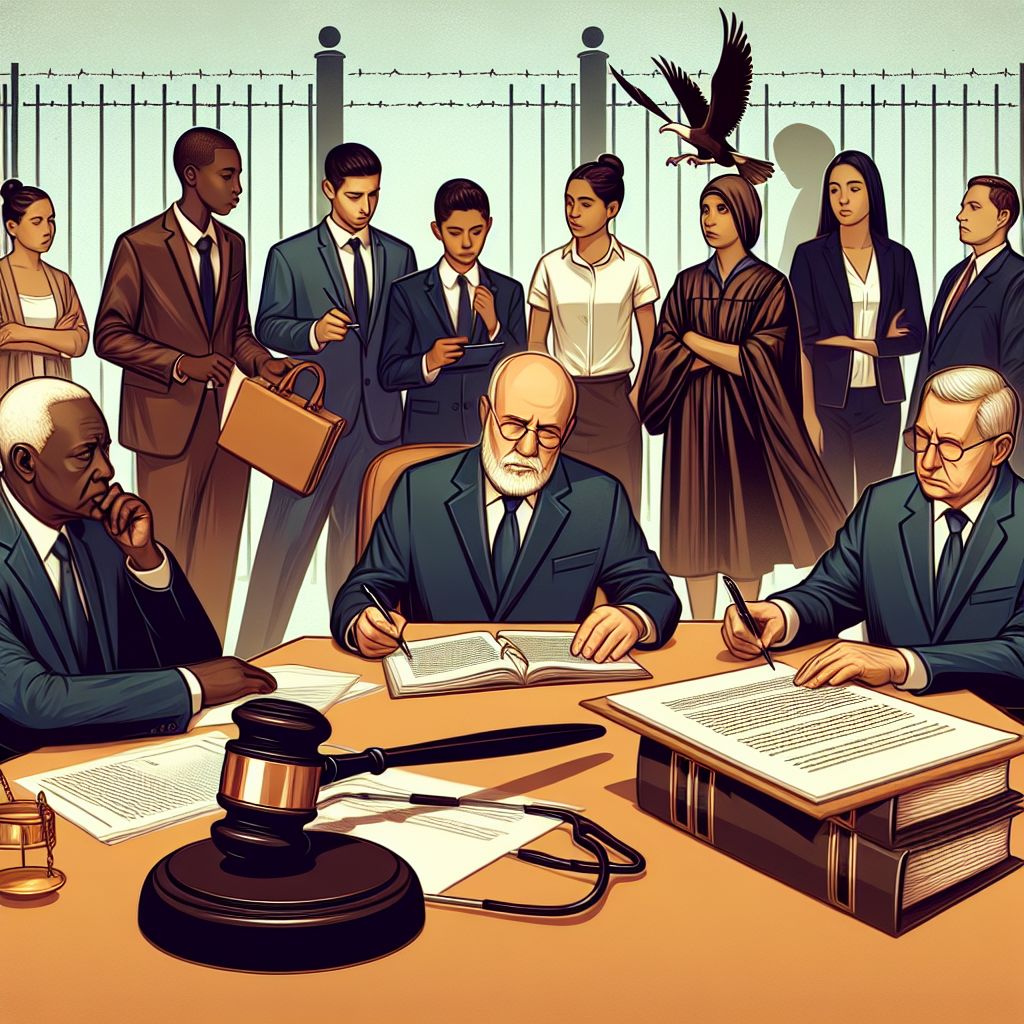The recent hearing in The GEO Group v. Menocal has raised significant questions about the rights of contractors operating under the auspices of government agencies, specifically in the context of immigration enforcement. As the case unfolds, it appears that the justices are leaning towards skepticism regarding the contractor’s entitlement to an immediate appeal. The implications of this case could have far-reaching effects on how government contractors operate, particularly those involved in controversial areas such as immigration detention.
Background of the Case
The GEO Group, a private contractor running an ICE detention facility, faces claims from detainees asserting that their rights have been violated. The central issue at stake is whether the contractor can claim an immediate right of appeal when a lower court dismisses its argument that it should not be held liable for the detainees’ claims, as it was merely following ICE’s directives. This situation presents a complex intersection of contractor liability and governmental immunity.
During the proceedings, the justices expressed reservations about the nature of the protections the contractor claims. The courtroom atmosphere suggested that the justices are not inclined to view the contractor’s defense as a valid basis for immediate appeal. Justice Clarence Thomas, in particular, highlighted the absence of explicit language in the relevant Supreme Court precedent, Yearsley v. W.A. Ross Construction, that would support the contractor’s position. This line of questioning set a clear tone for the argument, indicating that the court is not easily swayed by the contractor’s rationale.
Arguments Presented
In the arguments presented, counsel for GEO, Dominic Draye, struggled to provide a compelling justification for why the contractor should be granted immediate appeal rights. The justices probed whether the contractor’s claims stem from a misunderstanding of the legal principles involved. For instance, Justice Ketanji Brown Jackson questioned whether the fugitive tolling in release is more accurately characterized as a defense rather than an absolute immunity from litigation.
Justice Elena Kagan further dissected the criteria established in Yearsley, seeking clarity on whether the contractor’s argument was predicated on an assertion of having met these criteria to absolve itself of wrongdoing. The distinction between being protected from legal consequences and having merely established a defense against liability became a focal point of the discussion. The justices appeared to lean towards the interpretation that the protections claimed by the contractor do not rise to the level of immunity that would warrant immediate appellate review.

Potential Implications
The outcome of this case could set a precedent affecting not only the GEO Group but also other contractors involved in government operations. If the court ultimately decides that the contractor does not have the right to an immediate appeal, it may lead to increased liability for contractors operating under federal directives. This could change the landscape of how such contractors engage with government agencies and the extent to which they can rely on governmental immunity as a shield against litigation.
Moreover, the skepticism shown by the justices suggests that there may be a broader movement towards holding private contractors accountable for their actions, particularly in sensitive areas like immigration enforcement. This shift could prompt a reevaluation of the legal frameworks governing contractor operations in similar contexts.
- Understanding the legal nuances of contractor liability
- The role of government directives in contractor operations
- Implications for future contract negotiations
- Potential changes in litigation strategies for contractors
As the case progresses, it will be crucial to monitor how the court’s decisions shape the relationship between government contractors and the legal system. The justices’ apparent reluctance to grant immediate appeals may reflect a growing commitment to ensuring accountability within the realm of government contracting.
The recent court proceedings in The GEO Group v. Menocal have raised significant questions regarding the legal protections available to contractors operating under the auspices of government agencies. The case, which involves claims from ICE detainees against a contractor managing an ICE detention facility, has become a focal point for discussions about the limits of contractor immunity. The justices are grappling with whether a contractor can appeal immediately when a district court dismisses their argument that they are not liable for detainee claims, on the basis that they were merely following ICE’s directives.

Legal Protections for Contractors
During the argument, the justices expressed skepticism about the notion that contractors enjoy a blanket immunity from lawsuits, even when acting under government instructions. Justice Clarence Thomas initiated a critical dialogue, challenging the contractor’s counsel, Dominic Draye, to identify specific language in established Supreme Court precedent that supports the idea of immunity from suit. Draye’s inability to cite such language from debate on contractor protections left the justices unconvinced. justice ketanji brown jackson further probed the implications of the precedent set in yearsley v. W.A. ross construction, questioning whether it should be interpreted as a defense mechanism rather than a true immunity. this distinction is crucial, as it implies that while contractors may have some legal defenses available, they do not possess the right to an immediate appeal simply based on their compliance with government directives. the burden of proof on contractors justice elena kagan delved deeper into the yearsley precedent, specifically examining the criteria that contractors must meet to shift responsibility to the government. her inquiries highlighted a fundamental aspect of the case: whether contractors are asserting that they have fulfilled the compassionate release statute requirements to demonstrate their innocence or if they are claiming that their compliance with these criteria grants them immunity despite potential wrongdoing. this line of questioning underscores the complexity of establishing legal accountability for contractors operating within government frameworks. the justices’ probing suggests a broader skepticism regarding the legal shield that contractors might expect when facing lawsuits. as the discussions unfold, it becomes increasingly evident that the court is not inclined to grant contractors a free pass based solely on their operational compliance with federal agencies. the implications of this case could significantly influence the legal landscape surrounding contractor liabilities in similar contexts, particularly in light of the prevailing attitudes expressed by the justices. implications for future cases the outcome of the GEO group v. menocal may set a vital precedent regarding contractor accountability and the extent of legal protections available to them. the court’s apparent reluctance to accept the premise of immediate appeal for contractors could lead to an environment where contractors are more readily held accountable for their actions, especially in sensitive areas such as immigration detention facilities. as the legal discourse continues, one can anticipate that the justices will weigh the balance between protecting contractors and ensuring that individuals have recourse against potential abuses. in conclusion, the ongoing deliberations highlight a crucial tension in the legal framework governing government contractors. the justices’ inquiries reflect a growing concern about the adequacy of existing protections and the potential need for reform. as the court navigates these complex issues, the implications for contractors and the individuals they affect remain profound, potentially reshaping the landscape of contractor liability in the future. skepticism on religious claims
The recent court proceedings in the case of The GEO Group v. Menocal have raised significant questions about the legal protections available to contractors working with government entities, particularly in the context of immigration detention. The justices’ skepticism towards the contractor’s right to immediate appeal suggests a critical examination of the legal frameworks that govern such relationships. This scrutiny could have far-reaching implications for contractors engaged in similar operations across the country, especially those involved with the Immigration and Customs Enforcement (ICE) agency.
Legal Implications of the Court’s Stance
The core issue at hand is whether contractors like GEO can claim immunity from lawsuits when they are merely executing government directives. During the oral arguments, the justices, including Justice Clarence Thomas and Justice Ketanji Brown Jackson, emphasized that the protections sought by the contractor seem more akin to a defense rather than an absolute immunity from suit. This distinction is crucial, as it frames the contractor’s legal standing and ability to appeal decisions made by lower courts.
Justice Thomas’s inquiry into the absence of clear language in the relevant Supreme Court precedent, Yearsley v. W.A. Ross Construction, highlights the challenges contractors face in asserting such immunity. The implications of this ruling could redefine the legal landscape for contractors, as the justices appear to lean towards a perspective that sees the contractor’s defenses as insufficient to warrant immediate appellate review.
Furthermore, Justice Elena Kagan’s probing questions regarding the interpretation of the Yearsley criteria indicate a deeper examination of the thresholds that contractors must meet to claim immunity. By questioning whether compliance with these criteria equates to a lack of wrongdoing or merely a shield against liability, the court is signaling a potential shift in how contractor liability is adjudicated in future cases.

Potential Consequences for Government Contractors
The implications of this case extend beyond the immediate parties involved, potentially affecting all contractors operating under government contracts. If the court ultimately rules that such contractors do not possess the right to immediate appeal based on the arguments presented, it could lead to increased legal exposure for companies working with government entities. This would necessitate a reevaluation of how contractors approach their operational protocols and legal strategies.
Moreover, the decision could also influence public sentiment regarding the role of private contractors in sensitive areas such as immigration enforcement. As the legal landscape evolves, contractors might find themselves navigating a more complex regulatory environment, with heightened scrutiny from both the courts and the public. In this context, understanding the time limit on judgments becomes crucial for managing legal risks effectively.
In conclusion, the court’s deliberations in The GEO Group v. Menocal reflect a broader trend of accountability for government contractors, particularly in sectors that impact civil liberties. As the justices continue to dissect the nuances of contractor immunity, the outcomes may establish significant precedents that shape the future of government contracting and the legal protections afforded therein.